Digital Fabrication
Digital Fabrication
| Course type: | Lectures and Seminars |
|---|---|
| Course tutors: |
Marcin Strzała |
ASK course
| Status: | obligatory | Course Code: | ASK2-KT-Df |
|---|---|---|---|
| ETCS: | 3 | Expected own workload: | 25 |
| Proj/lab/semin hours: | 45 |
General description
Seminar – presentation by the teacher of basic information about the content of the subject’s education. Introducing students to the latest developments in the field of digital fabrication, rapid prototyping methods, and file-to-factory process. Presentation of available CAM techniques, their specificity, technical parameters, limitations and possibilities with particular reference to the possibility of use in architectural design, furniture and product design and as a tool for educating architects. More detailed discussion of the techniques used by students during laboratory classes. As part of developing knowledge in the field of digital fabrication, students are tasked with preparing a presentation in the form of films/podcasts in groups, on one of the proposed topics. Progress in the work on the presentations is consulted with the teacher during the classes, and the final result is presented on the group forum, discussed and evaluated. The starting materials, presentations of the lecturer and student-prepared presentations are made available to all course students on the e-learning platform.
Laboratory:
Laboratory task 1: 3d printing –lecturer presentation of the technique used in the task, its possibilities and limitations, presentation of objects made using the discussed device. Discussion of the topic, presentation of inspiration. Discussing the individual steps necessary to prepare the model using the 3d printing technique (in our case FDM printers). Paying attention to the aspect of the correctness of the prepared mesh, ways to verify the correctness of the prepared model, discussion of the possible size and minimum thickness of individual elements. Preparation of a digital file containing the printed model (format: .stl).
Working time: 1 week + fabrication of the form
Laboratory task 2: CNC milling – familiarising students with the CNC milling technique using a 2.5 axial machine. Discussing the accuracy, working field of the machine and possibilities of shaping the form of the object. Paying special attention to the possibility of material collision with the machine and the machine itself (leaving a safe material thickness at the bottom of the mould). Discussing how to prepare moulds for castings and materials used for them. Presentation of the topic of laboratory task and inspiration.
Working time: 1 week + fabrication of the form
Laboratory task 3: laser cutter – presentation ways of transformation of a freely shaped 3d solid into elements possible to be fabricated using a laser cutter (or other), such as panelling, rib structure, cross-section method, folding. Discussing the special role of assembly of the components of the model – generation of connectors, latches, profiles that support components in the relevant relations. Discussing the importance of the material, time needed for its treatment and its properties. Discussion of the laboratory task and presentation of inspiration. Presentation of how to generate the correct model elements using the 3d modeller. Discussing the distribution of the components of the model on the plane, their marking and laying on the size of the material. Providing students with ready-made scripts, discussing available computer programs to help you prepare the right files to cut.
Working time: 2 weeks + fabrication and assembly of the model.
Studio topics

PKB 2010-2015
This course refers to Thesis project (DS4) each year.